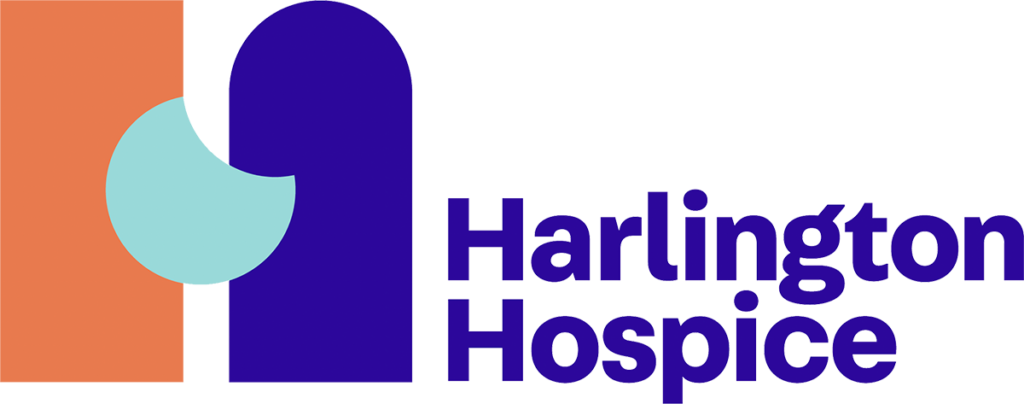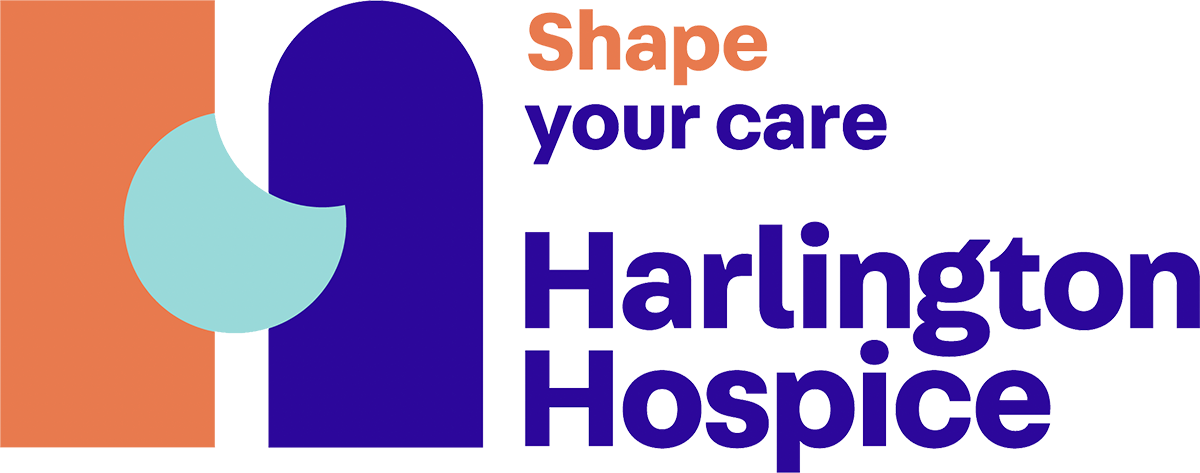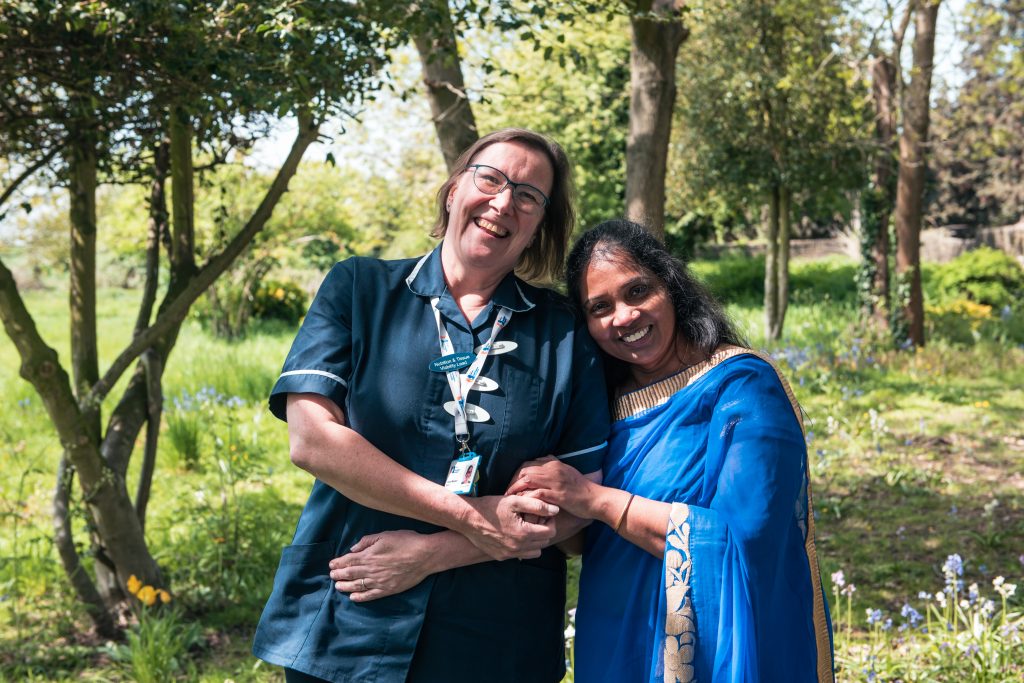In the last week of her 6-month GP trainee rotation at Michael Sobell House, Dr Mariam Koronfel spoke to Harry, our Communications Officer, about her time working on the Inpatient Unit. Mariam shared about her experience of working as part of a multi-disciplinary team, the value of simply being present for someone else, and the personal spiritual impact of her time at Michael Sobell House.
Has working at the Inpatient Unit at Michael Sobell House been different to your time working in a hospital?
The type of patients you see here you often don’t see in hospitals because they will have already been referred to a palliative care team. As a GP trainee, we’re trained to fix people and to help them get better. In a hospice care setting, when you are working with patients in this last stage of life, it is about supporting both patients and their families to have a comfortable ending. That’s not something you really do in a hospital.
I’ve definitely learnt a lot and seen things I would not otherwise have seen or know how to manage. A lot of the time, the people we are caring for have been told that there is no active treatment, but actually there are lots of other things that we can do to support them. I have a lot more appreciation for those things now. There’s a different aim in hospice care – it’s to support people to just have good days.
When someone is having palliative care it doesn’t mean they are imminently dying, there’s phases to it. There is a lot more life to live between being in palliative care and actually dying.
Can you give some examples of those other things that can be done to support people receiving palliative care at the House?
It’s about making everyday count. Whether that’s through supporting them to achieve things they want to do, or maybe something they haven’t been able to do before and want to do now that they know time is short. Just working with them to feel more comfortable and better in general, even if that doesn’t mean their illness is getting better.
Understandably, a lot of the time people are really anxious and scared. Sometimes just being by their bedside is enough. Being of Muslim faith myself there are also things that we do to comfort people, for instance reciting the Quran, which is something that I’ve done for people staying with us.
Another thing is supporting family members and friends. There was a little seven year old who was here the day before her mum died and that was really difficult. I was simply spending time with her doing arts and crafts, just being there.
Most people don’t know what to do when you are interacting with an end of life journey so there’s a lot of supporting families through that period. There’s a lot more care that can be done, even just offering a massage, remembering memories and talking about who they used to be. It can be a much nicer moment than just sitting and waiting for someone to die.
Everything we do really depends on the individuals we are working with. Different people will always be at different stages and have different feelings and goals for their life. For instance, some people are very open about wanting to know what the active dying process will look like and what will happen – this is true for patients and those closest to them. Whereas others really don’t want to have that conversation until it happens. It’s an in the moment thing and being with them through the process that’s important.
When working in hospice care, it feels like you are not just using skills and knowledge you have learnt but are using yourself, your time, your presence. And that’s very meaningful.
Has your GP rotation changed your understanding of hospice care and the dying process?
Before I came in, I thought it would be a really sad place. There is sadness, but also a lot of happy moments, like when we supported a woman and her family to go to Disneyland Paris. It’s weird but I think one of the first things I noticed about MSH when I first joined was it’s just really bright and everyone is quite smiley. So, it’s really changed my impression.
Understanding the phases of death is something else that I’ve learnt on my rotation. There are things you can do to support: symptoms that you can control, psychological support you can offer. Most people talk about ‘natural deaths’ and those don’t happen immediately, there is a process of dying. Sometimes, the most meaningful thing that can happen is that our patient has died how they would want to, that their choices have been respected and their worries have been addressed.
The other thing is, as a Muslim, I have beliefs about what happens at the time of death and actually experiencing it was very spiritually enriching not just medically enriching. Death is a really significant religious moment because there is this idea of transitioning from what we believe to be the worldly life to the Next life. So, being able to witness that process is almost like an additional part of that faith in the sense that I’ve believed in it but now I’m experiencing it with others. I think that element of spirituality surrounding the dying process and death is the thing that I didn’t anticipate to be honest. Supporting people at the end of life seemed an isolated medical process, you do your job and it’s not really personal. But, my experience at the House has been very personal. For example, as Muslims we believe that you have a body and a soul and when you die that soul is taken away, that’s how you die. For me, just being with someone when they die can feel like you are witnessing that spiritual transition happen.
What is it like working with a multi-disciplinary team with such a range of expertise and experience?
Honestly, the Harlington Hospice team are the best team I have worked with. Everyone appreciates how important this moment is for people staying with us and those close to them. And everyone is willing to go the extra mile to make sure people are comfortable and feel safe and looked after. Everything is about dignity and respect.
It’s nice because you are looking after someone holistically. Everyone working with one person adds something, a different insight or piece of expertise, that creates a whole approach. For example, I might say medically that someone is anxious or that I’ve been treating them for specific symptoms pharmacologically, like shortness of breath. Then they will also have a Physiotherapy Team who will help them with an exercise to do or teach them a specific technique, a Psychotherapist who is supporting them psychologically to also help them manage their breathlessness, and a Complimentary therapist who will put them at ease. With everyone working together and sharing knowledge, you have a much better view of how to care for each unique person.
Is there anything you would like to tell a GP who was considering doing their rotation at Michael Sobell House?
Honestly, it will be one of the best rotations they go through. In terms of fulfilment, in terms of feeling invested, feeling like you are a valued member of the team. It’s very rewarding to see how much just mindful presence can make a difference. There is always something that can be done to make someone feel a little bit better.







